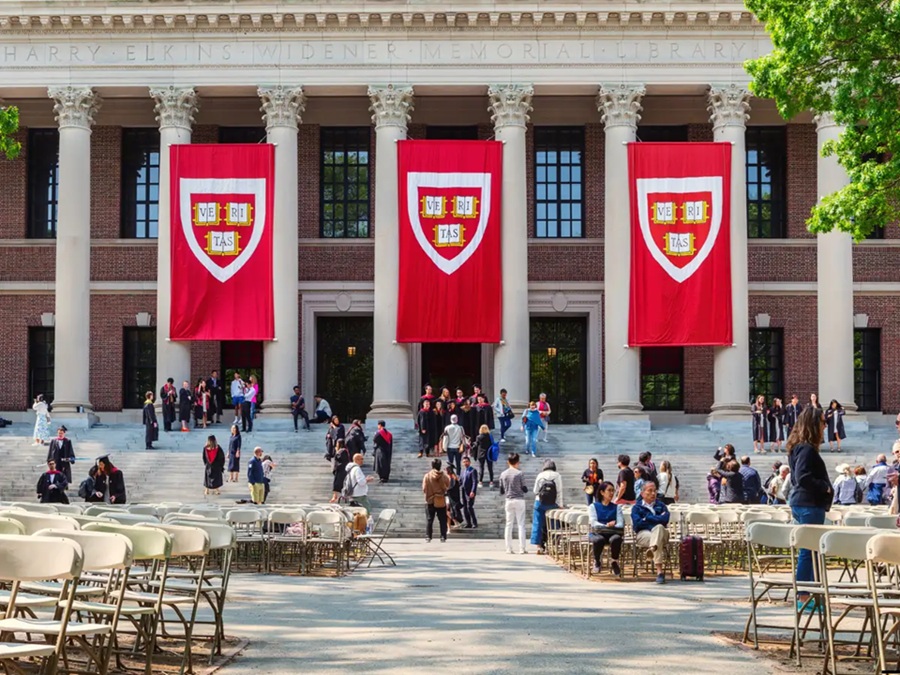In a stunning move that has sparked outrage in academic circles and raised serious concerns about the future of U.S. higher education, the Trump administration has announced a sweeping ban on Harvard University from enrolling new international students. This unprecedented action, framed by the administration as a national security measure, is being widely condemned as a politically motivated attack on one of the world's most prestigious educational institutions.
A Sudden and Controversial Decision
The decision, announced in a terse statement by the Department of Homeland Security (DHS), cites “national interest concerns and ongoing investigations into improper foreign influence” as reasons for barring Harvard from accepting international students starting with the upcoming academic term. While the statement did not provide specific evidence, officials referenced alleged ties between Harvard researchers and foreign governments, particularly China, as justification.
The move comes amid broader tensions between the United States and China and follows a pattern of policies during President Donald Trump’s time in office that have targeted academic institutions for perceived laxity in handling foreign influence and intellectual property theft.
However, critics argue that this latest action goes far beyond reasonable measures and represents a dramatic escalation in the administration's hardline stance on immigration and global engagement.
Fallout and Reaction
Harvard University President Lawrence Bacow responded swiftly, calling the move “an attack on the core principles of academic freedom and international collaboration.” In a strongly worded statement, Bacow vowed to challenge the order in court and expressed deep concern for the thousands of international students who were preparing to attend the university.
“International students are an integral part of our academic community,” Bacow said. “They contribute immensely to research, diversity, and the exchange of ideas that define institutions of higher learning. This policy is both discriminatory and deeply counterproductive to the values America claims to uphold.”
The announcement was met with alarm across the higher education community. Leaders from universities across the country voiced support for Harvard and condemned the administration’s decision as dangerous and short-sighted.
The Association of American Universities (AAU), which represents 65 leading research universities in the U.S., released a statement calling the ban “a reckless assault on higher education and America's global leadership in research and innovation.”
Legal and Diplomatic Implications
Legal experts say the administration’s action could face significant challenges in federal court. While the government does have broad authority over immigration policy, barring a single institution from enrolling international students based on vague national security claims may not withstand judicial scrutiny.
“This is an extreme and likely unconstitutional use of executive power,” said David Cole, legal director of the American Civil Liberties Union (ACLU). “It raises serious First and Fourteenth Amendment concerns and could trigger years of legal battles.”
Internationally, the policy has already drawn criticism from foreign governments and educational leaders. China’s Ministry of Foreign Affairs condemned the ban as an “act of discrimination and politicization of education,” while the European Commission called it “deeply troubling” and urged the U.S. to reconsider.
The diplomatic fallout could be substantial, particularly as many countries see higher education exchanges as key components of their relationships with the United States. The move may also damage the reputation of American universities, long seen as global leaders in education and research.
Broader Context: Anti-Immigration Rhetoric and Educational Nationalism
The barring of Harvard from enrolling international students fits into a broader pattern of anti-immigration rhetoric and “educational nationalism” that characterized much of the Trump administration’s approach to foreign policy and domestic security. During his term, Trump repeatedly raised concerns about Chinese students and researchers, going so far as to suggest that some were involved in espionage or technology theft.
In 2020, the administration attempted to expel international students who were taking only online classes due to COVID-19—an order that was ultimately reversed following a lawsuit spearheaded by Harvard and MIT.
This latest development appears to be the culmination of those earlier efforts, setting a precedent that critics fear could spread to other universities or escalate into a broader clampdown on international academic exchange.
The Human Cost
Perhaps most overlooked in the immediate media storm are the students themselves. For many international students, gaining admission to Harvard is the culmination of years of effort, sacrifice, and ambition. Now, thousands of prospective and current students are left in limbo, their educational futures uncertain.
“This was my dream,” said Priya Ranganathan, an admitted student from India. “I worked so hard to be accepted. Now, everything is just… gone. I don’t know what I’ll do next.”
Stories like Priya’s are multiplying across the globe, as students and their families scramble to understand the implications of the ban and look for alternative opportunities. Some are considering deferring their studies or applying to institutions in more welcoming countries such as Canada, the UK, or Australia.
Conclusion
While the Trump administration insists that the policy is necessary for national security, its critics see it as a politically driven measure that undermines the core values of education, openness, and international collaboration. The consequences—legal, diplomatic, academic, and personal—are already beginning to unfold.
As Harvard prepares its legal challenge and international students weigh their dwindling options, one thing is clear: this decision marks a new and troubling chapter in the intersection of education, politics, and international relations in America.
